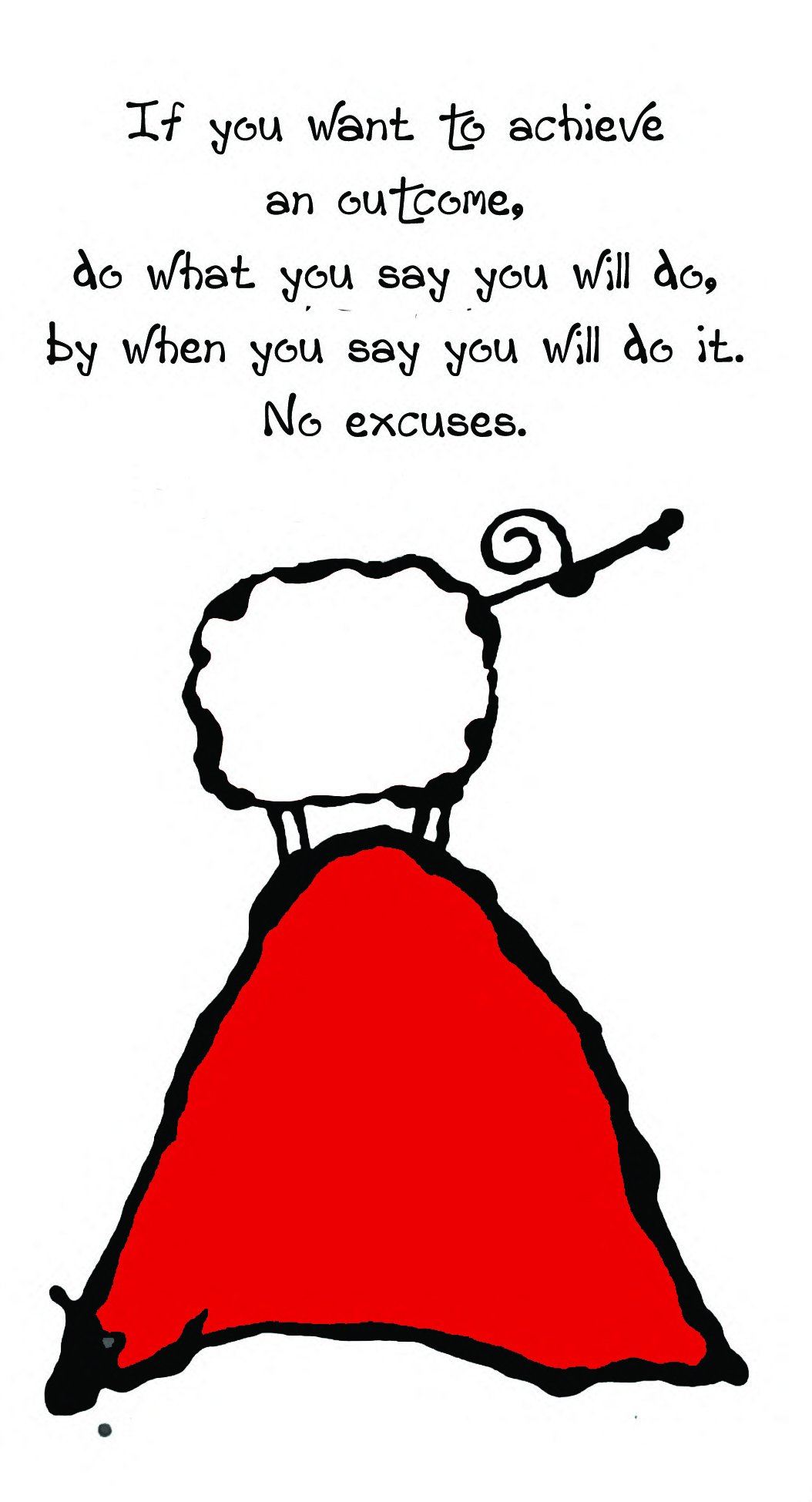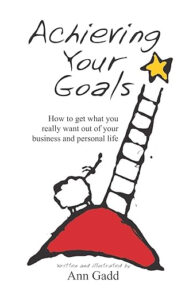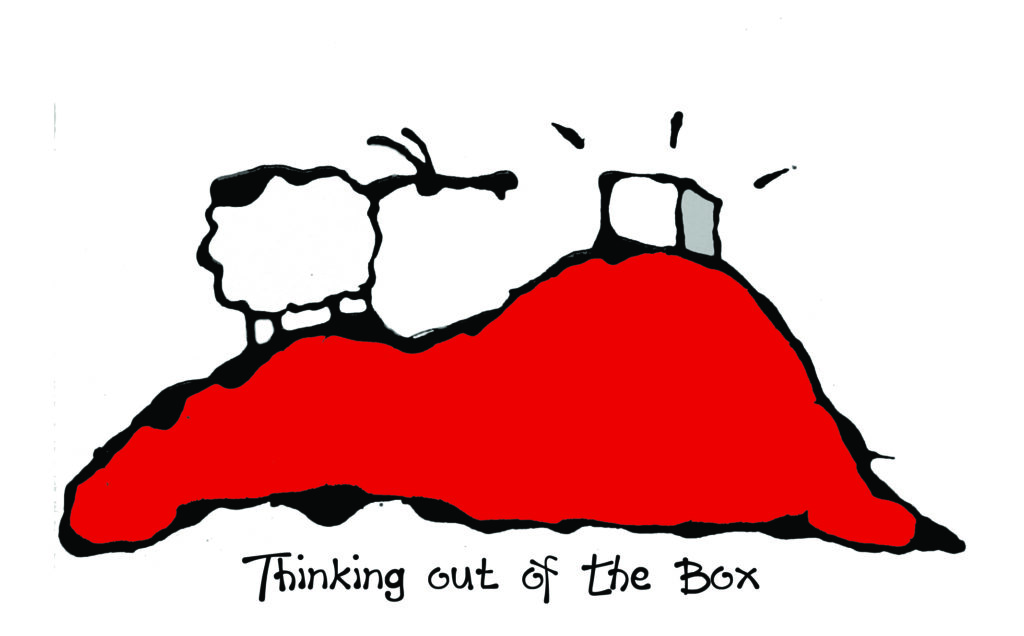Becoming a conscious co-creator in your life
- How do you create the life you want?
- How do you stop feeling like a pawn being moved around on a giant chessboard and reconnect with your empowered self?
- How do you spend more time being and less time doing?
- How do you master yourself and your life to co-create your own destiny?
It was Women’s Day and I was due to open an exhibition of my latest sheep paintings at The Blou Donki Gallery in Clarens that evening. With time on my hands, I took myself off for a walk in the mountains. Reflecting on a life lesson taught to me by friend and mentor, Brenda, I conceived the idea for a book. Returning to the B&B, I started to write. The result was The Ambitious Sheep, (now reprinted as Achieving Your Goals), a simple allegory of a sheep who wanted to step away from the flock, to be more than a follower — a leader sheep — and how the sheep achieves the goal. (The book has since been reprinted four times.)
Into a society where ‘over-promise’ and ‘under-deliver’ is the norm, comes a sheep who learns the benefits of personal integrity — doing what you say you will, by when you say you will. This forms the basis of the story of the three sheep with desires to be more than roast lamb with vegetables.
A simple lesson from a sheep
The lesson is by no means a new concept, universal truths seldom are, but, like so many truths, they are often hidden in lengthy tomes which we buy with good intent and end up using them as hefty doorstops. Personally, I’ve always favoured keeping things simple. At times I’ve struggled to maintain this degree of integrity. I find reasons to procrastinate and, more recently, I’ve had more ‘senior moments’ than I’d have liked. But I understand the concept and work hard to live by it. So, what is the lesson that this sheep has to offer?
The lesson: Be your word.
It’s really that simple. Do what you say you will, by when you say you will. Would you rather employ a plumber who shows up on time and does the job as quoted, or one who is late and then adds on extra charges? But, when we apply this integrity to ourselves, it becomes harder. The principle can apply to all areas of your being, be they spiritual, mental, emotional, or physical needs.
How it works
John 1 in the Bible starts off with: “In the beginning was the word…” From this “word” came all creation. We are microcosms of the macrocosm – the creative being which people call God / Allah / Jehovah / The Divine. If the word is the source of all that exists, then the word holds incredible creative power for each of us. We speak things into being. Hence the popularity of affirmations. Similarly, for us to derive the personal power to make things happen, our word needs to be our truth. This is how we create or manifest.
All great teachers and leaders throughout time have this common trait: They do what they say they will do, by when they say they will do it. Integrity is the guarantee of success. To be effective means to commit to a goal be it physical, emotional, mental, or spiritual and then to create steps towards achieving that goal.
Incidentally, the word ‘commit’ derives from ‘com’ (to bring together) and mittere (to send). Therefore, to commit to your goal means to focus (or bring together) your goal or ideas and thereby to send it into manifestation.

The conscious and subconscious mind
Your subconscious mind is very important when it comes to assisting you in achieving what you want in life. While your conscious mind controls around five per cent of your brain power, the subconscious controls 95 per cent. It is responsible for everything your body needs to function properly, which includes eating, digesting, breathing and learnt behaviours and habits. It also records and stores our experiences and knowledge.
It is incredibly powerful and is responsible for much of how your life pans out. Yet its power is largely ignored by your conscious mind. If the unconscious mind is powerful, the conscious mind is clever, but it lacks the ability to make things happen. In the book Nudge by Richard H. Thaler and Cass R. Sunstein, the example given is that of a tiny man riding a huge elephant. Unlike the conscious mind, the subconscious mind responds to your literal word. It doesn’t question. It doesn’t reason. For the subconscious mind, time is not linear — there is no past or future, just the present.
Take a hypnotist. If they hypnotise someone and then communicate to their subconscious mind that the onion they are given is actually a juicy apple, they will munch away happily. (I’ve actually seen my son do this.) The onion eater’s conscious mind can see it’s an onion, but the message in the subconscious overrides it and the conscious mind acts upon the suggestion.
By working consciously with your subconscious mind, you gain control of the ‘elephant’ and can direct it according to your needs.
How does this affect your affirmations or goals?
If you say: “I will finish these reports by Friday,” and then don’t, the message to your subconscious is: I don’t do what I say I will do, therefore my word is not true. The literal translation to your subconscious is: Say = not do. Then you do your affirmation practice, yet don’t achieve the desired result and can’t understand why.
Let’s say one day you decide you want to become a successful artist, but when you tell this to yourself, your subconscious has no reason to act to make it happen. Its stored memories have little to draw from, because your subconscious has learnt that what you say seldom happens. So, you don’t have the backing of this incredibly powerful force. Since you do not usually do what you say you will do, why would this time be any different? Only five per cent of you is backing the project. Your subconscious mind has unwittingly become your private saboteur.
However, if you always do what you say you will do, when you say you will do it, your subconscious takes your words ‘I am a thriving artist,’ as a direct order to be acted upon to make just that happen.
Being specific
If you affirm something in present time, such as ‘I live in abundance’ the subconscious understands because there is no past or future in its literal world. However, affirming: ‘I want to live in abundance,’ you are telling your subconscious that you want to spend your life wanting to live with the desire for abundance, but not actually having it.
Present time is the way to communicate with the subconscious. Believe it. Live it. ‘I am’ versus ‘I want’. Get that message through to your subconscious and the results will be awesome. However, there is a problem with the word abundance. It’s not specific enough. An abundance of fleas? Unsolicited emails? Problems? The word needs clarification. ‘I live without financial constraints, in a cottage I own surrounded by beautiful countryside,’ is way more instructive for your subconscious to manifest.
Hoping versus knowing
There is a big difference between hoping and knowing. When a professional golfer prepares to hit a ball, even before the club strikes there is a sense of knowing that he is about to hit a beauty. Or before the dart even leaves a dart-thrower’s hand, he may have a sense that he will get a bullseye. Professionals invariably know when they will perform well, while amateurs may hope to get lucky. You have probably experienced this sense of knowing in your own life.
If your word is true. If you always do as you say you will even if you only tell it to yourself, then the message to your subconscious is: Do as I tell you to do. Based on your actions in the past, your subconscious knows whether you mean business. Fortunately, if you have not always followed through on your word, it is possible to reprogramme your subconscious.
When you act on your word, you become the creator of your own reality. You become effective in all aspects of life. You live in knowing, rather than hoping. Now, let’s say you live and act according to your word. You get an idea for a business venture. You know you can make it happen, whereas the person who does not act on their word can only hope that it will happen. Through achieving goals in the past, you have developed good self-esteem (not an inflated ego which comes when we don’t have good self-esteem). You already believe in yourself and your ideas. You don’t need the approval of others. You know where you want to go, and you know what you must do to get there. Sure, life throws curve balls, failures happen, but now you have the self-esteem and confidence to handle this. Failure is just part of your learning curve. You go about it methodically. You focus on committing to what you said you would and not just on hoping your aim will be achieved. You detach from the outcome and focus on the here-and-now.
That’s where you have the most power: If you can act now, then the future will be in alignment with your actions. If you don’t act in the present, then you shift into the future and most likely into fear of what the outcome will or won’t be.
Summary
- Be your word.
- Be specific with your affirmations.
- Affirm in the now not the future.
Illustrations by Ann Gadd
A tribute to Brenda van Straaten

Ann Gadd is an author and artist. She has 42 books published with 18 language translations on a wide variety of subjects, most recently focusing on the Enneagram. Her most popular art series is the sheep/ewe paintings. More recently she has been combining her wildlife photography with graffiti and Khoisan forms of expression.
Illustrations by Ann Gadd
Websites:
https://enneagrams9paths.com
https://southafricanart.co
https://anngadd.co.za
https://artforewe.co.za
https://anngaddphotography.co.za


